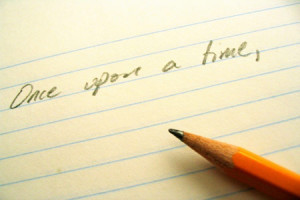Words Without Chains
 Many writing teachers urge new and not-so-new writers to free-write daily. Free-writing comes under other names called practice writing, daily writing, etc., but the concept behind it is the same. These writing exercises are for a writer what playing scales are for a musician or hitting balls are for a tennis player or golfer. They warm you up. They help you fine tune your style.
Many writing teachers urge new and not-so-new writers to free-write daily. Free-writing comes under other names called practice writing, daily writing, etc., but the concept behind it is the same. These writing exercises are for a writer what playing scales are for a musician or hitting balls are for a tennis player or golfer. They warm you up. They help you fine tune your style.
What exactly is free-writing? It is taking a piece of paper or your computer keyboard and you start to write without stopping. You never worry about spelling or editing. You don’t think, “I can’t say that, it’s weird.” You say it. You let it come out.
Even if you freeze you are not supposed to stop and think. You go on by repeating your last few words such as:
I went to the store to buy a case of Coke, a case of Coke, a case of Coke because I loved Coke since i was a kid, a kid, a kid, and my mother only would let me have three and my brother had the other three and and and and I often stole his. My sister, my sister, my sister always lurked, unseen, and waited for my brother and I to fight over one can of Coke, steal and hid the others.
Yes there are mistakes, yes there are repetitions, but the idea is to keep going without caring for punctuation, grammar, typos. You release words like waterfalls.
The idea behind it as that as writers we are stopped by what we feel is safe and correct. We constraint our writing within preconceived walls and tracks. We need to get away from that concept in free-writing. Often free-writing produces the energy that leads to other good writing. Take the free-write about the case of Coke. That led to a short story about sibling rivalry acted out with a brother and sister stealing each other’s treasures in the third person from the point of view of adults.
What if it doesn’t produce anything? So what? Does each piano scale produce a sonata? No, but with enough scale practice the sonata will be played better. You’re not supposed to publish free-writing.
Measurement
There are two ways to measure free-writes. One is by a timer set for ten minutes. The other is to fill up three pages. Less than that really isn’t enough. More is fine.
Starting
Put your pencil/pen/fingers to paper/keyboard and start and don’t stop until the time/pages are filled. Don’t answer the phone, go to the toilet or take a sip of tea.
What if you don’t know how to start?
1. Find a trigger such as emotional phrases: I love…, I hate…, I want…, it pisses me off…, I remember…, I don’t remember…
2. Use a color. I wanted to wear red as child but mother said it clashed with my hair. Work your way through the rainbow. Just think how many writing exercises you can do around different words for purple: lavender, lilac, violet, mauve, purple…
3. Find a sentence in a book, newspaper or magazine and use that as a trigger.
4. Use a piece of conversation that you overheard.
Where should I free write?
Anywhere you want: on a bus, train, airplane. In your kitchen, office. At a café. Sure it is ideal to be locked away with quiet or soft music in the background, but it is more important to do it.
What to do with your free-writing
1. Ignore what you wrote. No one ever needs to make every word written count. We don’t see the canvases that the artists didn’t like. A professor at Simmons College once said that every writer has 250,000 bad words in them. Free-writing gets rid of some.
2. Go get a cup of tea or coffee and come back and reread what you wrote circling something you like.
3. Transfer what you like into a journal for later use or not.
4. Develop what you started.
Set yourself the goal of free-writing for a month even if you have to lock yourself in a bathroom to do it. By then it will become a habit that you miss.
Nathalie Goldberg
Nathalie Goldberg is one of the strongest proponents of free writing but there is no common consensus on the acceptance of this technique: “For fifteen years now, at the beginning of every writing workshop, I have repeated the rules for writing practice. So, I will repeat them again here. And I want to say why I repeat them: Because they are the bottom line, the beginning of all writing, the foundation of learning to trust your own mind. Trusting your own mind is essential for writing.”
Note: Her rules include losing control and don’t think.
Give yourself a time limit. Write for one or ten or twenty minutes, and then stop.
Keep your hand moving until the time is up. Do not pause to stare into space or to read what you’ve written. Write quickly but not in a hurry.
Pay no attention to grammar, spelling, punctuation, neatness, or style. Nobody else needs to read what you produce here. The correctness and quality of what you write do not matter; the act of writing does.
If you get off the topic or run out of ideas, keep writing anyway. If necessary, write nonsense or whatever comes into your head, or simply scribble: anything to keep the hand moving.
If you feel bored or uncomfortable as you’re writing, ask yourself what’s bothering you and write about that.
When the time is up, look over what you’ve written, and mark passages that contain ideas or phrases that might be worth keeping or elaborating on in a subsequent free-writing session.
Goldberg’s rules appear to be based on those developed by Jack Kerouac, who she cites several times. Kerouac developed 30 “rules” in his Belief & Technique for Modern Prose. Kerouac prose writing method is a form of narrative stream of consciousness. Kerouac himself cites the “trance writing” of William Butler Yeats as a precursor of his own practice.
Goldberg’s rules, which are infused with the study and practise of Zen Buddhism, make the process of free writing more accessible for a beginner and are perhaps less extreme than those of Kerouac, although they are still tinged with an element of mysticism.
Massimo Marino is a scientist envisioning science fiction. He spent years at CERN and The Lawrence Berkeley Lab followed by lead positions with Apple, Inc. and the World Economic Forum. He is also co-founder of “Squares on Blue”, a Big Data Analytics service company.
Massimo currently lives in France and crosses the border with Switzerland multiple times daily, although he is no smuggler.
As a scientist writing science fiction, he went from smashing particles at accelerators at SLAC and CERN to smashing words on a computer screen.
He’s the author of multi-awarded Daimones Trilogy.
His novels have received the Seal of Excellency from both AwesomeIndies.net and IndiePENdents.org
• 2012 PRG Reviewer’s Choice Award Winner in Science Fiction
• 2013 Hall of Fame – Best in Science Fiction, Quality Reads UK Book Club
• 2013 PRG Reviewer’s Choice Award Winner in Science Fiction Series
• 2014 Finalist – Science Fiction – Indie Excellence Awards L.A.
• 2014 Award Winner – Science Fiction Honorable Mention – Readers’ Favorite Annual Awards
His novels are available from Amazon, Barnes & Noble (Nook), iTunes Apple Store, and many other retailers around the world.
Join his mailing list for new releases, or follow him on Facebook, Google+, and Twitter.
The post Words Without Chains appeared first on § Author Massimo Marino.




